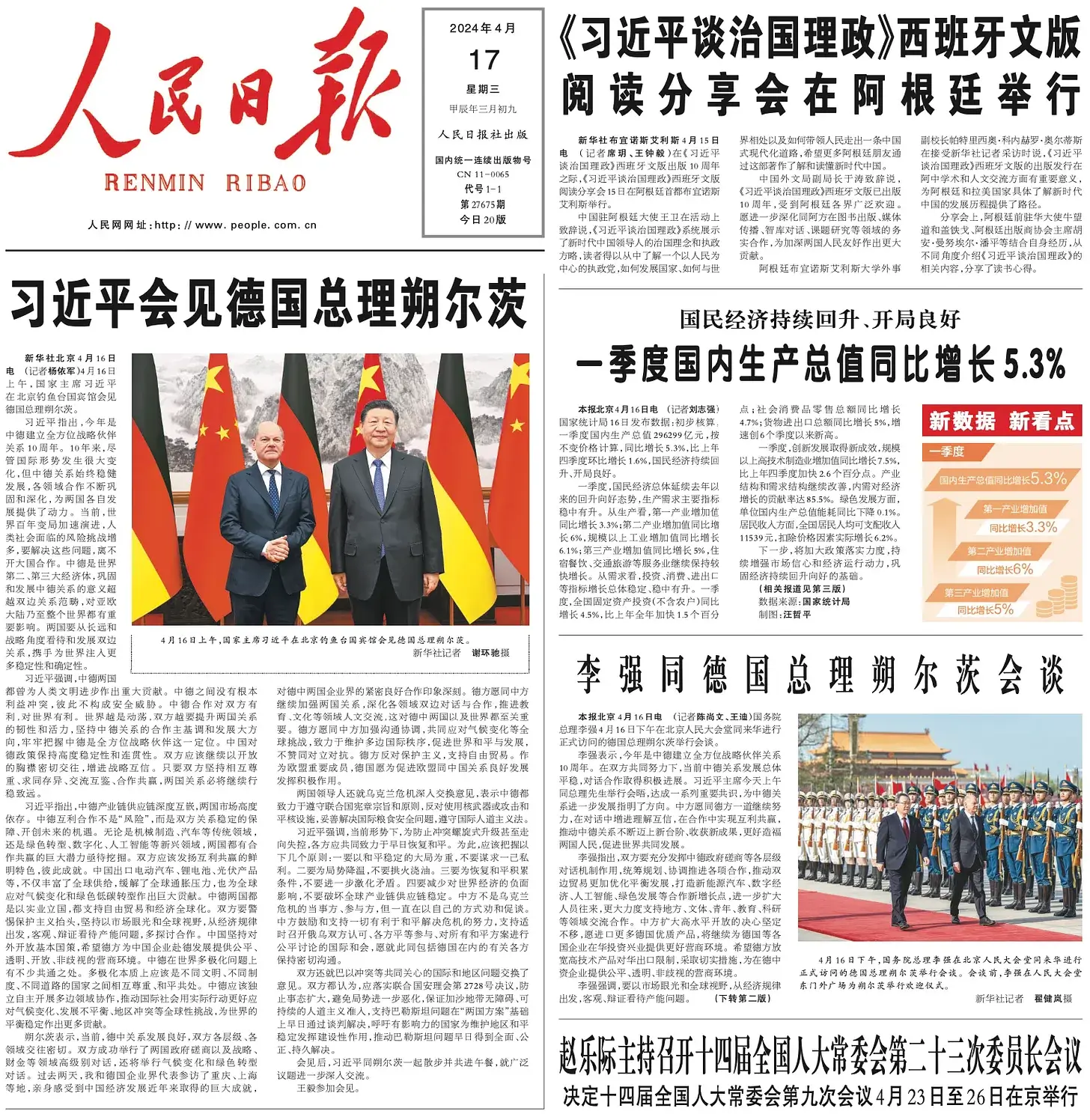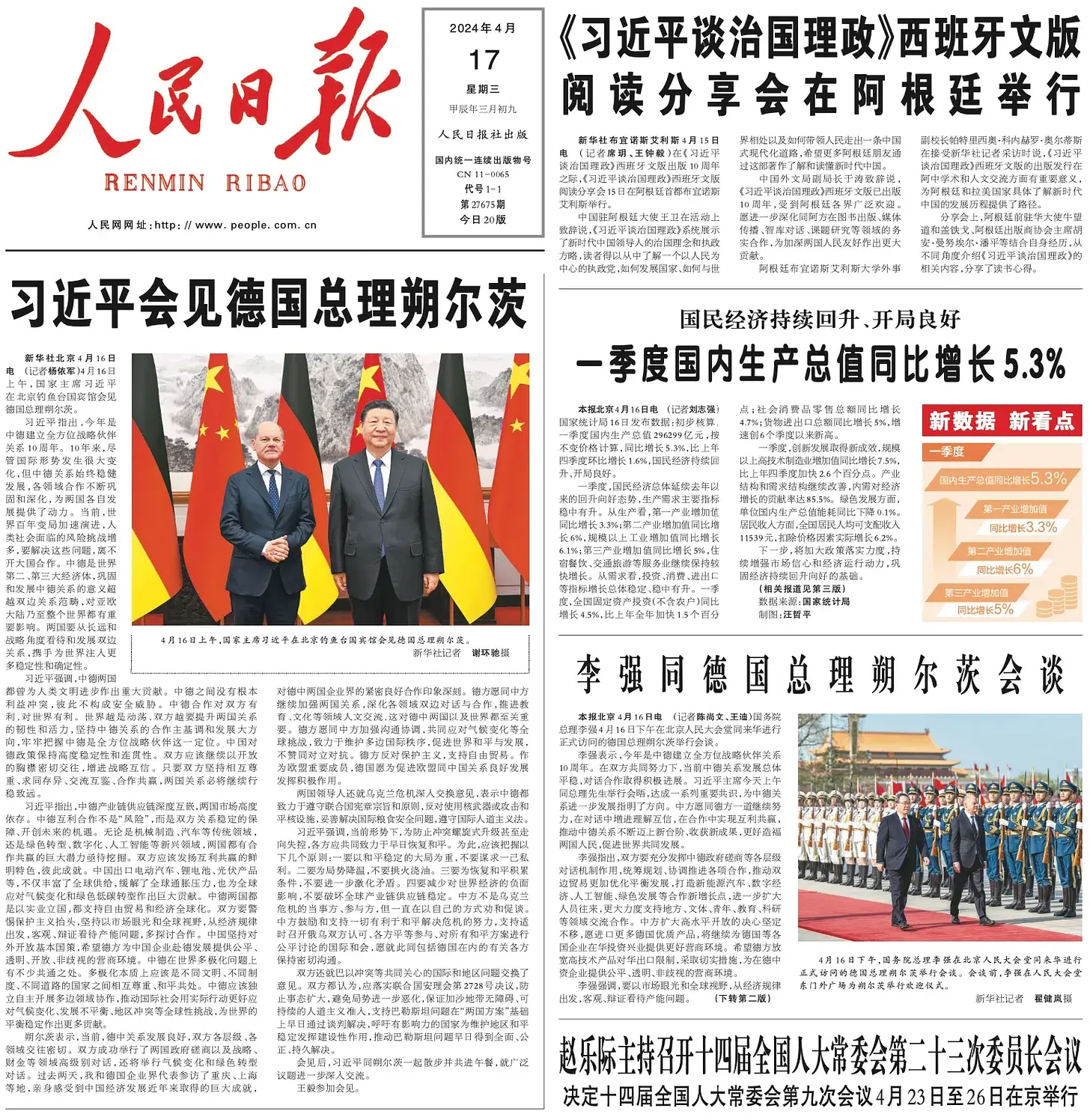Welcome to a/symmetric, our weekly newsletter. Each week, we bring you news and analysis on the global industrial contest, where production is power and competition is (often) asymmetric. To receive issues over email, subscribe here.
This week:
- Is Germany Beijing’s useful idiot? Chancellor Olaf Scholz wants to thread a fine needle on China. But the asymmetries in Sino-German ties, strategies, and priorities make that a tall challenge.
- Weekly Links Round-Up: Australia’s plan to boost critical manufacturing, the UK’s academic security, and China orders Apple to takedown chat apps
Germany: China’s useful idiot?
Beijing was rather pleased with the German leader’s China trip this week, judging by the front page splash and rosy coverage that People’s Daily gave to Olaf Scholz (see photo above).
Evidently, Scholz’s visit to China, with a delegation of business executives in tow, provided plenty of fodder for Beijing to spin its preferred narrative.
“Xi Jinping pointed out that the supply chain of the Sino-German industrial chain is deeply embedded, and the markets of the two countries are highly dependent. Sino-German mutually beneficial cooperation is not a ‘risk,’” declared People’s Daily. Elsewhere, state media were eager to headline Scholz’s comments dubbing himself an “old friend” of China and insisting that Germany “welcomes Chinese cars.”
The party line is clear: amid US, EU, and allies’ concerns about the risks of dependence on China, Beijing will exploit Germany Inc’s hunger for business contracts to divide and weaken the west’s economic security agenda.
In that respect, there’s a case to be made that Germany is proving to be a useful idiot for Beijing’s purposes:someone “who can be manipulated or exploited to advance a cause or political agenda.”
Short-term incentives vs. long-term interests
Take the joint declaration signed on Tuesday between Germany and China on autonomous and connected driving.
The MoU appears to be light on specifics, and merely commits both sides to continued “dialogue and cooperation” on issues like technical standards and data sharing protocols. Yet the fact that it was signed at all is a win for Beijing — especially when the US is investigating Chinese cars for data security risks, and the EU has launched an anti-subsidy probe in Chinese EVS.
Plus, the development would seem to place Germany directly at odds with the EU’s hardening approach to economic security. Brussels is reportedly set to launch a probe into China’s medical device procurement policies, on top of existing investigations into Chinese wind turbines and solar panels. At the very least, Germany’s embrace of collaboration with China on autonomous driving punctures any semblance of EU unity on the industrial security question.
But for China, the spoils go far beyond business considerations: access to and control of driving data is key to its “transportation superpower” ambitions, which revolve around building an integrated global transportation and logistics network overseen by Beijing.
If history is any guide, China will likely leverage this asymmetry in strategic aims to give Germany Inc short-term, placatory gains – while keeping its own eyes on the grander prize.
Military-civil fusion vs. division
There’s also another important asymmetry: China’s approach to military-civil fusion — where civilian and commercial endeavors blur into military and defense industrial sectors, and vice versa — versus Germany’s strong division of military and civilian research.
In embracing China, Scholz may think that it’s possible to ringfence certain engagements with Beijing to reap economic benefits for German businesses while steering clear of security risks.
That assessment does not stand up to recent experiences, however.
China’s 2016 acquisition of German robotics firm Kuka is a case in point. Even though the Chinese buyer was home appliances maker Midea, Kuka was swiftly integrated into China’s military-civil fusion complex, including via a joint venture focused on industrial robotics systems with a subsidiary of China Ordnance Equipment Group, a major state-owned military enterprise.
More recently, Kuka robots were seen1 in an “automated production line” in state-owned China Aerospace Science and Industry Corp.’s (CASIC) satellite factory at the Wuhan National Space Industrial Base:

Kuka robots. (Source: Wuhan Government)
To sum up: Scholz is trying to thread a fine needle on China. But the asymmetries inherent in the Germany-China relationship — including their respective approaches to economic security and industrial competition, and divergent sensitivities on dual-use technologies — make that a tall challenge.
Weekly Links Round-Up
️ “Grand designs: The high-risk plan to make Australian industry great again.” Anne Hyland reports on Canberra’s plan to ramp up critical manufacturing Down Under, and reducing the economy’s dependence on raw material exports. Critics of the Future Made in Australia Act are worried about the government supporting dud companies and sectors. Supporters of a “Made in Australia” push say classical economic ideas around specialization and trade need to be updated.
Ed Husic, the federal Minister for Industry and Science, tells Hyland: “We often get it put to us that we should only rigidly stick to comparative advantage. “China never had a comparative advantage in producing solar panels, or most of the things that are being used as part of the [green energy transition].” (Sydney Morning Herald)
️ The UK’s “academic security.” British deputy prime minister Oliver Dowden warned that dependence on Chinese and other foreign research funding could threaten the country’s universities. “…[W]e must ensure that some universities’ reliance on foreign funding does not become a dependency by which they can be influenced, exploited, or even coerced, or indeed, find themselves vulnerable in the fallout from heightened geopolitical tensions,” he said. (Politico)
️ China forced Apple to remove WhatsApp, Signal, Telegram, and Threads. Beijing ordered the messaging apps to be taken down from the Chinese Apple App Store because of national security concerns. Apple, being dependent on the Chinese market and industrial base, was compelled to comply. (WSJ)




